National parks 'need better management' to help wildlife
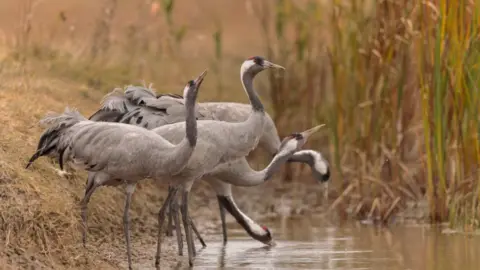 Sergey Dereliev
Sergey DerelievProtected sites such as national parks need to be properly managed if they are to help wildlife recover, according to a new study.
Researchers said simply setting land aside for conservation was not enough.
An international team involving UK scientists at Bangor, Cambridge and Exeter universities examined 1,500 sites in 68 countries.
The Welsh government said it was improving the condition of protected sites and the connections between them.
Researchers focused on waterbirds but said the findings had "wider relevance" for conservation.
The work, published in the journal Nature, is the largest ever global study of the effects of protected areas on wildlife.
While conserving land has been shown to help stop deforestation and habitat loss, it has been less clear what impact that has had on efforts to halt the worldwide decline in biodiversity.
The researchers studied sites that hosted more than 27,000 waterbird populations.
While some were having a positive impact, many others were not.
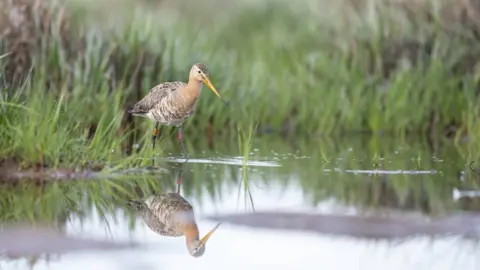 Matti Saranpää
Matti SaranpääJulia Jones, professor of conservation science at Bangor University who co-authored the paper, said they were "disappointing but not surprising" findings.
"As conservation scientists, we'd like to hear that protected areas are doing brilliantly and reversing losses of species around the world. But actually what we find is that the results are very mixed," she said.
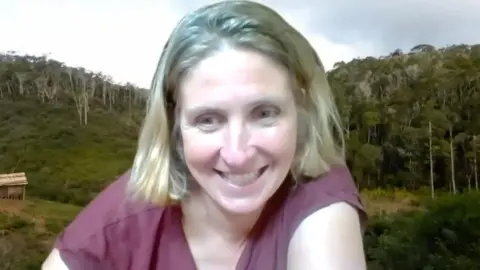
Actively managing areas to protect specific species was crucial to boosting the numbers of rare birds, the study concluded.
Without such interventions - ranging from managing water levels and availability of food and shelter to predator control - these designated landscapes were more likely to be ineffective.
The researchers want the findings to inform debate at a major conference of world leaders in China this autumn, where it is hoped tougher action to protect nature in the coming decade can be agreed.
Plans to formally protect 30% of the Earth's surface by 2030 have been called for, but the study's authors said targets focusing on how sites were managed were needed too.
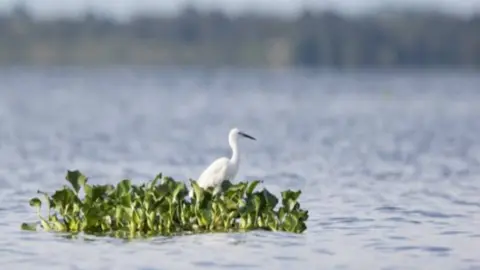 Matti Saranpää
Matti Saranpää"Drawing lines on a map on its own doesn't help nature and doesn't reverse declines in species," Prof Jones said.
"Yes potentially we need more conservation sites but more important than increased quantity is increased quality."
The study focused on waterbirds because there was plenty of data available gathered by an army of thousands of volunteers contributing to national schemes across the world.
At the RSPB's wetland reserve in Newport, home to rare species such as bearded tits, little egrets and avocets, the charity's head of policy for Wales, Sharon Thompson, said the study's findings "definitely chimes with what we've been saying for a while".
"If sites aren't managed properly then they aren't meeting their potential," she added.
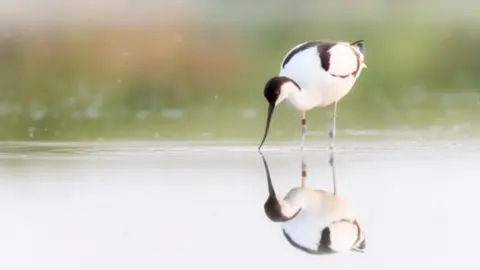 Robert Blanken
Robert BlankenA recent report found nearly half of Wales' conservation sites were not being monitored due to lack of funds and, where data was available, 60% were in "unfavourable" condition.
Ms Thompson said the charity wanted to see more government investment to ensure "proper management and monitoring of protected sites", as well as new nature recovery targets.
"We're in a nature and climate emergency and we can't just sit here twiddling our thumbs," she said.
A Welsh government spokesman said: "Our nature networks programme will improve the condition of our protected sites and the connections between them.
"The programme will create resilient ecological networks to help our most precious habitats and wildlife thrive.
Lee Waters, the minister for climate change, will host an intensive review in May looking at the role designations play "in achieving the agreed global target of having 30% of our land and sea protected and positively managed by 2030", the spokesman added.

- WILD MOUNTAINS OF SNOWDONIA: Five farming families open their gates and share their lives
- LAST CHANCE TO SAVE: Will Millard explores some of Wales’s hidden historic buildings

